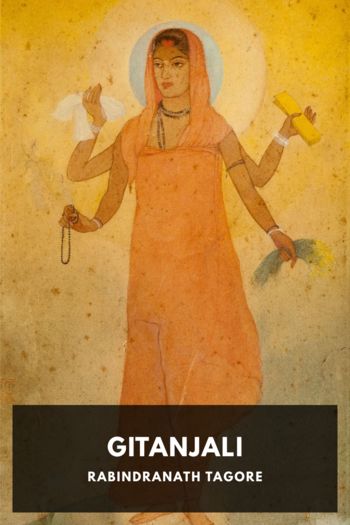My Reminiscences - Rabindranath Tagore (best ereader for pc txt) 📗

- Author: Rabindranath Tagore
Book online «My Reminiscences - Rabindranath Tagore (best ereader for pc txt) 📗». Author Rabindranath Tagore
I cannot say that I have never been cheated while in England, but not in any way which it would be fair to hold in remembrance. What grew chiefly upon me, rather, was the conviction that only those who are trustworthy know how to trust. I was an unknown foreigner, and could have easily evaded payment with impunity, yet no London shopkeeper ever mistrusted me.
During the whole period of my stay in England I was mixed up in a farcical comedy which I had to play out from start to finish. I happened to get acquainted with the widow of some departed high Anglo-Indian official. She was good enough to call me by the pet-name Ruby. Some Indian friend of hers had composed a doleful poem in English in memory of her husband. It is needless to expatiate on its poetic merit or felicity of diction. As my ill-luck would have it, the composer had indicated that the dirge was to be chanted to the mode Behaga. So the widow one day entreated me to sing it to her thus. Like the silly innocent that I was, I weakly acceded. There was unfortunately no one there but I who could realise the atrociously ludicrous way in which the Behaga mode combined with those absurd verses. The widow seemed intensely touched to hear the Indian’s lament for her husband sung to its native melody. I thought that there the matter ended, but that was not to be.
I frequently met the widowed lady at different social gatherings, and when after dinner we joined the ladies in the drawing room, she would ask me to sing that Behaga. Everyone else would anticipate some extraordinary specimen of Indian music and would add their entreaties to hers. Then from her pocket would come forth printed copies of that fateful composition, and my ears begin to redden and tingle. And at last, with bowed head and quavering voice I would have to make a beginning—but too keenly conscious that to none else in the room but me was this performance sufficiently heartrending. At the end, amidst much suppressed tittering, there would come a chorus of “Thank you very much!” “How interesting!” And in spite of its being winter I would perspire all over. Who would have predicted at my birth or at his death what a severe blow to me would be the demise of this estimable Anglo-Indian!
Then, for a time, while I was living with Dr. Scott and attending lectures at the University College, I lost touch with the widow. She was in a suburban locality some distance away from London, and I frequently got letters from her inviting me there. But my dread of that dirge kept me from accepting these invitations. At length I got a pressing telegram from her. I was on my way to college when this telegram reached me and my stay in England was then about to come to its close. I thought to myself I ought to see the widow once more before my departure, and so yielded to her importunity.
Instead of coming home from college I went straight to the railway station. It was a horrible day, bitterly cold, snowing and foggy. The station I was bound for was the terminus of the line. So I felt quite easy in mind and did not think it worth while to inquire about the time of arrival.
All the station platforms were coming on the right hand side, and in the right hand corner seat I had ensconced myself reading a book. It had already become so dark that nothing was visible outside. One by one the other passengers got down at their destinations. We reached and left the station just before the last one. Then the train stopped again, but there was nobody to be seen, nor any lights or platform. The mere passenger has no means of divining why trains should sometimes stop at the wrong times and places, so, giving up the attempt, I went on with my reading. Then the train began to move backwards. There seems to be no accounting for railway eccentricity, thought I as I once more returned to my book. But when we came right back to the previous station, I could remain indifferent no longer. “When are we getting to ⸻?” I inquired at the station. “You are just coming from there,” was the reply. “Where are we going now, then?” I asked, thoroughly flurried. “To London.” I thereupon understood that this was a shuttle train. On inquiring about the next train to ⸻ I was informed that there were no more trains that night. And in reply to my next question I gathered that there was no inn within five miles.
I had left home after breakfast at ten in the morning, and had had nothing since. When abstinence is the only choice, an ascetic frame of mind comes easy. I buttoned up my thick overcoat to the neck and seating myself





Comments (0)